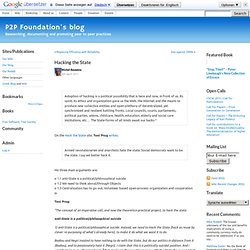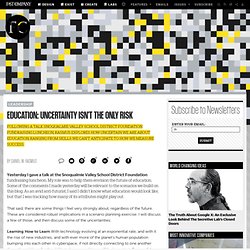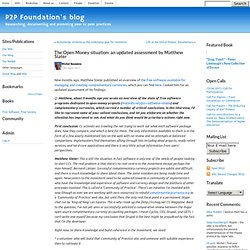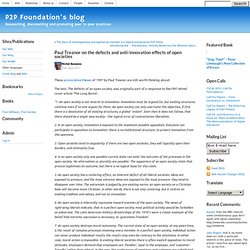

Business Model for Open Source Stuff. Hacking the State. O 1.1 anti-State is a political/philosophical suicide o 1.2 We need to think about/through Objects o 1.3 Centralization has to go out.

Volunteer based open-process organization and cooperation in “The concept of an imperative call, and now the theoretico-practical project, to hack the state: anti-State is a political/philosophical suicide 1) anti-State is a political/philosophical suicide. Instead, we need to Hack the State (hack as reuse by clever re-purposing of what’s already here), to make it do what we want it to do. Badiou and Negri insisted to have nothing to do with the State, but do our politics in distance from it (Badiou), and to passionately hate it (Negri). We need to think about/through Objects 2) Thinking through the concept of Ideas is not enough. In which sense, i can’t tell with precision now, but i’m working on answers in various forms (phd, journal papers, a book, this blog). Centralization has to go out. The Death of the Hierarchical Party Form Summary. Education: Uncertainty Isn't the Only Risk. Yesterday I gave a talk at the Snoqualmie Valley School District Foundation fundraising luncheon.

My role was to help them envision the future of education. Some of the comments I made yesterday will be relevant to the scenarios we build on this blog. As an avid anti-futurist, I said I didn't know what education would look like, but that I was tracking how many of its attributes might play out. That said, there are some things I feel very strongly about, regardless of the future. These are considered robust implications in a scenario planning exercise. Learning How to Learn With technology evolving at an exponential rate, and with it the rise of new industries; and with ever more of the planet's human population bumping into each other in cyberspace, if not directly connecting to one another through social media, the ability to learn new things will be important.
Transliteracy People will need to know how to effectively communicate in various media. Uncertainties Conclusion. The Declining Marginal Productivity of Consumer Debt. The Open Money situation - Updated (Matthew Slater) Q: Matthew, about 9 months ago you wrote an overview of the state of free software programs dedicated to open money projects (matslats.net/ijccr-software-review) and complementary currencies, which carried a number of critical conclusions.

In this interview, I’d like to represent some of your salient conclusions, and let you elaborate on whether the situation has improved or not. And what do you think would be prioritary actions right now. First conclusion: Cc activists are trawling the net trying to work out what each software package does, how they compare, and which is best for them. The only information available to them is in the form of a few poorly maintained lists on the web with no review and no attempts at balanced comparisons. Implementers find themselves sifting through lists including dead projects, ready rolled services, and hard-core applications and there is very little actual information from users’ perspectives.
Matthew Slater: This is still the situation. Paul Treanor on the defects and anti-innovation effects of open societies. These provocative theses of 1997 by Paul Treanor are still worth thinking about: The text, The defects of an open society, was originally part of a response to the1997 Wired cover article ‘The Long Boom’. “1.

An open society is not neutral to innovation. Innovation must be argued for, but existing structures continue even if no-one argues for them. An open society can only overcome this objection, if first there is a dissolution of all existing structures, a global ‘restart’. 2. 3. 4. 5. 6. 7. 8. 9. 10. 11. 12. WaPo: Top Secret America. Huge investigative piece in the Washington Post into “A hidden world growing beyond control” — National Security Inc. — about the massive expansion of the private and government intelligence and counterterrorism activities.

What was historically sensitive government-only activities has been outsourced to for-profit vendors, with a variety of problems associated with this: “To ensure that the country’s most sensitive duties are carried out only by people loyal above all to the nation’s interest, federal rules say contractors may not perform what are called “inherently government functions.” But they do, all the time and in every intelligence and counterterrorism agency, according to a two-year investigation by The Washington Post,” I found the interactive graphic most interesting: click for interactive graphic.